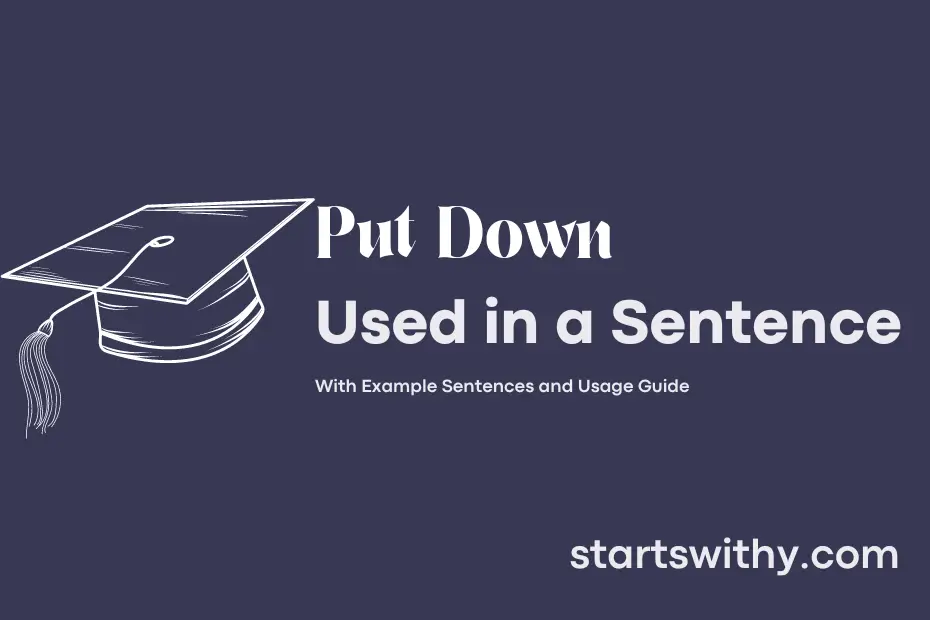Have you ever come across the phrase “put down” and wondered what it means? Essentially, “put down” is a common phrasal verb in English that is used to indicate placing something onto a surface or to write something down.
This versatile term can be used in various contexts and is often employed in both literal and figurative ways. Whether you are physically setting an object down or expressing a critical opinion about something or someone, the phrase “put down” can convey a range of meanings with just two simple words.
7 Examples Of Put Down Used In a Sentence For Kids
- Put down your crayons and listen to the teacher.
- Can you put down that book and come play with us?
- Remember to put down your lunchbox when you’re finished eating.
- It’s time to put down your toys and get ready for naptime.
- Please put down your pencil and raise your hand to ask a question.
- Don’t forget to put down your backpack before sitting at your desk.
- Let’s all put down our blocks and sing a song together.
14 Sentences with Put Down Examples
- Put down your worries and focus on your studies.
- Don’t put down the pen until you have finished writing the assignment.
- Put down your phone and pay attention to the lecturer.
- Remember to put down all the important points in your notes.
- It’s important to put down all your thoughts before starting your essay.
- Please put down your college ID number on the exam paper.
- Make sure to put down the correct date on your project submission.
- Always put down the references you use in your research papers.
- Put down a reminder in your calendar for the upcoming exam dates.
- Don’t forget to put down the contact details of your group members for the group project.
- Put down the correct formulas in your math notebook for quick reference.
- Put down your ideas for the college fest event in writing.
- Put down your preferences for elective courses in the registration form.
- Remember to put down your attendance in the attendance register before leaving the class.
How To Use Put Down in Sentences?
Put Down in a sentence:
Put Down is a phrasal verb that can have various meanings in different contexts. It is commonly used to refer to the act of placing something onto a surface or stopping an activity.
Here are some examples of how to use Put Down in a sentence:
- She put down her bags and sat on the bench to rest.
- The teacher asked the students to put down their pencils and listen to the instructions.
- I need to put down the book for a moment and grab a cup of coffee.
- Could you please put down the vase gently on the table?
- The doctor advised him to put down the heavy weights to avoid injury.
Remember that in each sentence, Put Down is used to indicate the action of placing something gently on a surface or stopping a particular activity. It is important to ensure the correct usage based on the context of the sentence.
Practice using Put Down in various sentences to become familiar with its usage and meaning. As you continue to incorporate it into your writing and conversations, you will become more comfortable with using this phrasal verb accurately and effectively.
Conclusion
In conclusion, using sentences that put down others are harmful and can have negative effects on both the person being criticized and the one delivering the remarks. These types of sentences can breed insecurity, damage self-esteem, and create a toxic environment. It’s important to remember that words have power and can deeply impact those around us. By choosing our words carefully and opting for constructive, uplifting sentences instead of putting others down, we can foster a more positive and supportive atmosphere.
Constructive criticism can be helpful when provided in a respectful and considerate manner. By offering feedback that is constructive and encouraging rather than degrading or hurtful, we can effectively communicate our thoughts while nurturing growth and improvement in others. Let’s strive to uplift and empower one another with our words, rather than tearing each other down.



